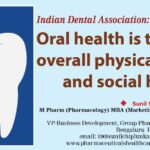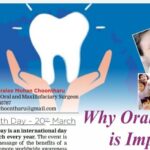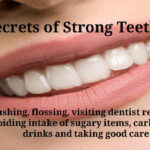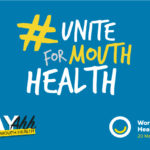Oral health ideally, should be an important healthcare priority – however, it is often neglected. The WHO has estimated in 2017 that about 3.5 billion people in this world suffer oral diseases. Easy availability and consumption of sugary comfort foods and drinks, increased use of alcohol and tobacco, and growing incidence of diabetes and other metabolic disorders – has propelled the rise of oral disease.
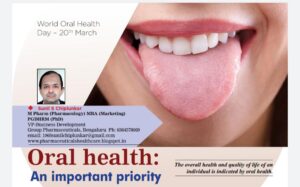

Oral care refers to healthcare practices of taking care of one’s oral cavity (mouth). This ideally, should be an important healthcare priority – however, it is often neglected. People spend large amounts of time and money on products for hair and skin care. However, many of these same people do not brush twice a day, making themselves vulnerable to oral health issues that mainly include: dental hypersensitivity pain and discomfort, dental caries and gingivitis or mild gum disease. Easy availability and consumption of sugary comfort foods and drinks, increased use of alcohol and tobacco, and growing incidence of diabetes and other metabolic disorders – has propelled the rise of oral disease.
Dentin hypersensitivity
Easy and comfortable consumption of food by people of all age groups is essential for assimilation of nutrients. One needs to masticate food (chew food well into a paste form in the mouth) and make a bolus for swallowing. Mixing of ingested food with saliva starts the process of digestion in the mouth itself and antimicrobial proteins of saliva provide immunity. Improper mastication of food and insufficient mixing with saliva can contribute to indigestion. In elders and metabolic disease patients, hyposalivation or reduced saliva production reduces immune or self-defense function in the mouth causing increased oral infectious disease.
The hardest substance of the body is enamel – it is the outer layer of teeth. The enamel layer has enamelin proteins that attracts calcium and phosphate ions, thereby causing mineral deposition and grants strength to enamel layer. The second inner middle layer is dentin that has a number of dentinal tubules with fluid in it, and also has minerals. The third innermost layer with blood vessels and nerves is the pulp cavity. At the junction between dentin and pulp cavity are specialized cells called odontoblasts that manufacture elements required for dentin and enamel.
Excessive hard brushing of teeth, friction, continuous rubbing of tooth surface by the opposite teeth, attack of enamel by acids produced by bacteria, effect of acid that is refluxed from stomach in patients suffering hyperacidity problems and finally broken teeth – causes enamel erosion and enamel thinning. This exposes the second dentin layer. When food, touch, movement of saliva and air when speaking stimulate the dentinal fluid in exposed dentinal tubes, the person suffers a sharp sudden short term pain particularly when consuming ice cream, cold foods or hot foods. This sensitivity pain of teeth due to eroded enamel and exposed dentin is called dentin hypersensitivity.
Short term dentin hypersensitivity discomfort and pain is also caused by various dental procedures like scaling and crown placement. Dentin hypersensitivity (DH) is a common challenge in persons 20 years to 40 years age group – although it can occur in younger adults and elders. DH is more common in ladies.
Dental caries and gingivitis
In dental caries, there is bacterial infection of teeth resulting in tiny holes or openings called cavities. Dental caries infection results in loss of tooth minerals thereby rendering teeth becoming weak and there is loss of function. When toothpaste is used while brushing teeth, the calcium and phosphate ions released from the paste saturates saliva and there is deposition of these minerals to remineralize and strengthen enamel. Hence, proper brushing with toothpaste reinforces enamel with minerals and the mechanical action of brushing removes the soft sticky film present on teeth that contains the caries-causing bacteria. Dentists recommend special toothpastes based on patient requirement for better oral health and protection from dental caries
Gingivitis is mild gum infection. Severe gum infection can lead to infection in other organs including the heart. Gingivitis affects mouth function and makes eating and drinking very problematic. Hence, regular dental check-up is a wise choice. Dental colleges welcome patients and offer free or very economical services. The advantage of dental colleges offering dental treatment is this supports dental education and the patient can benefit from advice plus treatment by highly qualified faculty.
Oral health is stressed by WHO (World Health Organization)
The WHO has estimated in 2017 that about 3.5 billion people in this world suffer oral diseases. Dental caries is the most common oral infection. The overall health and quality of life of an individual is indicated by oral health. The more dangerous oral disease is oral cancer. Gum disease progression is linked to diabetes, which too is a global burden. Hence, it is wise to gargle consistently after meals, brush with a good toothpaste twice daily, get a dental check-up every six months (do not hesitate – go to dental college hospitals for dental check-ups) and follow the dentist’s advice.


Sunil S Chiplunkar
M Pharm (Pharmacology) MBA (Marketing) PGDHRM (PhD)
VP – Business Development, Group Pharmaceuticals, Bangalore
E mail: 1969sunilchiplunkar@gmail.com
Mob: 63645 78669



